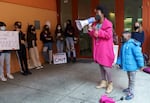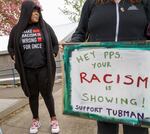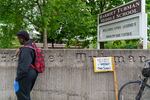
Students at Harriet Tubman Middle School in Northeast Portland have been protesting weekly over Portland Public Schools’ decision to place teacher Bryan Chu on leave. On May 13, 2022, students again left school and marched to the PPS district office to voice their concerns.
Kristyna Wentz-Graff / OPB
Sylena’s time as an eighth grader at Harriet Tubman Middle School in Northeast Portland is almost up. But for the last month, she says she hasn’t really learned much.
“When I wake up, and I get ready for school and all that, I keep thinking, ‘I’m not really going to learn anything at school,’ because there’s so many subs,” she said. “The majority of my classes have subs.”
Sylena described her school environment as “chaotic;” she said many of her peers roam the hallways during class, leaving substitute teachers in mostly empty classrooms and triggering a cycle in which all students miss out.
“Since so many kids skip the class, the subs don’t really teach,” she said. “And if they don’t skip the class, then they just disrupt the whole class time.”
Her mom, Nicole Kennedy, is the PTSA president at Tubman. She said the year started in a rough place with teacher and substitute teacher shortages. But the district’s decision to place one teacher, Bryan Chu, on leave in April made things worse. Students say Chu was a caring teacher who taught students about social justice and also provided a safe space in his classroom.

Nicole Kennedy is the PTSA president at Harriet Tubman Middle School. She said the year started in a rough place with teacher and substitute teacher shortages.
Kristyna Wentz-Graff / OPB
Now, parents and students say at least one other teacher is on leave and students have more subs than ever. Some Tubman students have been walking out of school weekly. They go to the Portland Public Schools district office, where they say their concerns go unheard and unaddressed.
“Teachers were already overextended, and the climate within Harriet Tubman was already chaotic,” Kennedy said. “I believe removing Mr. Chu just exacerbated everything and has really ramped up the chaos.”
Trying to find solutions
Parents have sent emails for weeks, seeking communication from the district about the staff members on leave and asking how the district will resolve other issues at Tubman.
But what’s going on at Tubman, while a unique result of years of tension between the school community and the district, also reflects broader problems across the district — particularly in middle schools.
While school is back full-time and things are as “normal” as they’ve been in over two years, parents and teachers at four Portland middle schools say teachers and students are struggling with staffing issues and an increased need for support. It’s causing students to lose learning time and teachers to leave the classroom, reflecting a statewide concern for the future of public schools in Oregon.
At Tubman, in addition to numerous parent emails and messages seeking help and information, prominent Portlanders have weighed in to district leadership. Late last month, the director of Lewis & Clark’s Oregon Writing Project, Linda Christensen, and Rethinking Schools Magazine editor/Zinn Education Project co-director Bill Bigelow wrote a letter to PPS administrators about Tubman. Their grandson is a student at the school.
They asked for the teachers on leave to be reinstated, for the district to bring “content specialists” into classrooms to teach students and build an administrative team with a “proven local track record”, and to increase the number of teachers at the school next year.
“Our teachers deserve more planning time as well as time to work with students in smaller settings because Tubman students’ education has been disrupted twice: first by the pandemic and again by a school district that has contributed to making Tubman a school in crisis,” they wrote.
Staffing issues, student behavior a district problem
When Kellogg Middle School teacher Susan Anglada Bartley read the letter from Christensen and Bigelow, she saw similarities in what’s going on at her school.
“I feel like it painted it as just a Tubman problem,” Anglada Bartley said. “We too are experiencing all of those problems, including targeting and silencing [of teachers].”
Anglada Bartley said she’s seen six of her peers leave Kellogg, a new middle school in Southeast Portland that opened this academic year. Their reasons for leaving may differ, she said, but every departure hurts students.
“Students may lack the experience of a full time educator in the classroom for up to weeks, or months at a time,” Anglada Bartley said. “They may also experience a revolving door of subs.”
Teachers who remain are asked to do more, leading to more exhaustion and overwork.
OPB spoke with a Portland middle school teacher who is on leave and unlikely to return to the classroom. OPB is not using his name because the teacher fears retaliation.
Coming back to school was difficult, the teacher said. With students wearing masks, they couldn’t read facial expressions. Keeping middle schoolers physically distanced was difficult.
Add to that the impact on students who’d been isolated for over a year, sometimes in less-than-ideal home situations: back in school again, they had to relearn how to be around others in a classroom setting. Compared to past years, the teacher said students’ behavior was more extreme, which left teachers trying to teach while also trying to do the work of a mental health professional or social worker, despite not having that training.
It was too much, the teacher said. After more than a decade in the classroom, they will likely not return.
“I don’t want to be a part of it anymore,” the teacher said.

“You are world changers,” says Latoya Lovely of Happy Valley, May 13, 2022, speaking to Harriet Tubman Middle School students who are unhappy with a Portland Public Schools decision to place teacher Bryan Chu on leave. Lovely says she resigned from PPS after experiencing racial discrimination.
Kristyna Wentz-Graff / OPB
The teacher said that faculty and students are trying their best in a “rigid” system that forces students to move from class to class quickly in buildings that don’t have all the resources needed to serve them. They said the anxiety and stress built up gradually over the year until it was too much to go into school every day. And they don’t see things changing,
“You feel like you gave up on your kids,” the teacher said, “but the system doesn’t have enough supports in place for those of us who were not able to sustain the pressure.”
At a loss
Portland Association of Teachers president Elizabeth Thiel said middle schools around the district have lost staff, with “numerous teachers” on medical leave for issues including stress. She said several teachers have left North Portland’s George Middle School this year.
“All of our middle schools have lost staff by every measure,” Thiel said.
A January 2022 report from the Oregon Education Association included survey results from members in several districts. A majority of members in Beaverton, Eugene, Hillsboro, and Portland said they couldn’t get everything done during their work day, and they were experiencing more stress.
Nearly half — 49% — of Portland members surveyed said they are considering leaving teaching altogether, or retiring sooner than they planned.
“The 2021-2022 school year could be a turning point or a breaking point for Oregon,” the authors of the report wrote. “If district and state leaders rise to the occasion and invest in getting desperately needed additional resources in the classroom and take steps to reduce unnecessary workloads, students will have the academic, behavioral, and emotional support they need for the long term and a massive loss of trained educators can be avoided. If not, things are only going to get worse.”
At Roseway Heights, another newer Northeast Portland middle school, a protest last November led to fights, a local example of state and national conversations around challenging student behavior and student mental health.
That was November. Nearing the end of the school year, Roseway Heights math and science teacher Colin Hawkins says students continue to deal with a lot — from bullying to unresolved conflicts between students — that results in students missing out on school.
“Students are often out of class for extensive periods of the day, we have a fairly large group, and an actually growing group of students who do not go to class on a regular basis,” Hawkins said. “... The problems we are facing are not really being dealt with at a district level with any sincerity.”
He said district efforts to implement restorative justice practices, an approach to discipline seen as an alternative to punishment that involves mediation and community building, haven’t been productive. He said the school is an “unsafe environment” for students, there aren’t enough subs, and staff hired to improve school climate instead spend their time monitoring student behavior in the hallways. Hawkins said all of it leaves students feeling disconnected from school.
“The students are highly demoralized,” Hawkins said.
Morale especially low in middle schools
State, students in sixth, eighth, and 11th grades are surveyed about school climate and other issues impacting them. Almost 60% of the almost 42,000 responses collected for the 2020 Student Health Survey were collected in spring 2021, and provide a sense of how students were feeling as they re-entered schools.
Academically, 54.90% of eighth graders in Multnomah County described their grades at mostly A’s and mostly B’s. 32.90% of eighth graders said they receive mostly C’s, D’s, and F’s.
The margins are much higher in 11th grade, with high school students showing stronger confidence in their academic progress. 78.90% of 11th graders said they were receiving top grades, and 17.20% said their grades were lower.
When it comes to behavior, a higher percentage of students in middle school said they are “often distracted from doing schoolwork because other students are misbehaving, for example, talking or fighting” compared to their high school peers.
Of Multnomah County sixth graders surveyed, 28.10% agreed or strongly agreed that they are often distracted due to students misbehaving. For eighth graders, it was 36.10% and for 11th graders, 19%.
PPS board members have recently spoken out about what they’ve seen firsthand at middle schools around the city. At a school board work session last week, board member Gary Hollands mentioned visiting Tubman, and wanting to see better outcomes for students at one of PPS’ most diverse middle schools.
“Our kids in the hallways, they’re not really responding in classrooms,” Hollands said. “I don’t know what kind of teaching is going on in these schools.”
During the same work session, a PPS parent who also works as a substitute in middle schools said students need more attention than they’re getting.
“I see serious skill gaps, I see dysregulation,” Emily Golden-Fields said at the meeting. (Dysregulation means being unable or struggling to handle emotions or emotional responses.) “I’m trying to teach argumentative writing – five paragraph essays – to sixth graders, but the majority can’t read the face of a clock.”
For middle schoolers, distance learning came at a crucial time for academic and social development, and doing school at home meant some students didn’t gain the skills they needed.
Roseway Heights teacher Hawkins said the time out of the school building contributed to the challenges schools are dealing with now.
“We had a lot of students who were left out in the cold and didn’t really get much of an education, didn’t get much socialization, started puberty without any kind of sense of community, and a lot of anger, which is developmentally appropriate,” Hawkins said.
“But when there’s no place to put it, it comes here and is exhibited in violence and outbursts.”

Students at Harriet Tubman Middle School in North Portland march to the Portland Public Schools district offices, May 13, 2022, unhappy over the district’s decision to place teacher Bryan Chu on leave.
Kristyna Wentz-Graff / OPB
Tubman students and teachers are experiencing similar turmoil. But the situation at Tubman is especially complex and fraught, and rooted in both the racist policies that shaped North and Northeast Portland and big questions about the future of the school.
PPS officials have stated support for the district’s Black students, directing federal funding to helping them catch up from the pandemic, tying the superintendent’s job performance to reading and math achievement goals, and dedicating bond funds to a new Center for Black Student Excellence.
Tubman parent Kamelah Adams said the district’s inaction towards Tubman doesn’t reflect those goals.
“The inadequate care that all of our students are receiving from PPS is appalling, and we should all be outraged,” said Adams. “I believe Harriet Tubman is what, 60% kids of color… and the state that the school is in, these are kids of color, we already know all the stats when it comes to that — so PPS needs to do better by its students.”
Lost opportunities for social, academic development
Middle school students weren’t the only ones who missed out on in-person learning the last two years. They also missed out on important experiences.
Dawn Becker is a school psychologist for the Multnomah Education Service District, where she mainly serves students in nearby Corbett.
“I feel like those middle school years are the first time that you are really experiencing some independence,” Becker said.
She said for students who missed that independence and new responsibility, the return to school has been hard.
“The students who missed that part are going into eighth and ninth grade… they are just kind of hot messes when it comes to keeping on top of their … organization, knowing how to conduct themselves without someone having to tell them every little thing.”
Some students are coming into school with more anxiety and feelings of being overwhelmed.
Socially, she said students are still figuring out where they fit in, and how to navigate positive relationships.
While Becker said students in elementary grades struggled socially at the beginning of the year too, some older students haven’t been able to develop social skills beyond phones or other technology.
“They’re not used to being around this many people in the middle and the high school,” Becker said.
Students have been through a lot in the last two years. And in order to teach them, Becker said middle school administrators should work on improving classroom climate, and making sure students have trusted adults they can go to for help.
“None of the academics is going to come if they’re so wrapped up in mental or emotional… any kind of things that they’re dealing with mentally and emotionally,” Becker said. “... You have to care for that part of them first before we can get into, ‘your grades are not great’. Well, no one’s grades are really great.”
What happens next year?
Kamelah Adams worries about whether her Tubman 8th-grader is getting what he needs now — and how that will impact him in years to come. ”My son is getting ready to go to Grant,” Adams said. “Grant is a rigorous school, and he is not going to be prepared.”

Kamelah Adams, left, at a protest led by Harriet Tubman Middle School students, May 13, 2022. Adams fears her Tubman eighth grader is not getting the education he needs to be prepared for high school.
Kristyna Wentz-Graff / OPB
“So why should I as a parent have to get tutors and stuff for him just to prepare him for high school? ... He’s not behind or anything, but I just want him to be equipped for high school, and the district has failed to do that.”
Parents at other middle schools say their children are behind too — and they’re seeking other options.
Lailah Hamblin has a seventh grader at Beaumont Middle School in Northeast Portland. She hasn’t heard about a higher need for subs at her son’s school. But her son is dealing with academic and mental health impacts of learning at home alone the last two years: She said he’s doing “very poorly” in his classes and being screened for depression. She blames the Portland Association of Teachers, who she said “refused” to go back to in-person instruction, echoing a belief held by some parents that Oregon’s teachers union played a large role in keeping Oregon school’s closed. Oregon Gov. Kate Brown said she kept schools closed in order to keep students and their families, as well as school staff, safe before ordering schools to reopen in March 2021.
“My son basically went from being a fifth grader at Rigler to a seventh grader at Beaumont,” Hamblin wrote in an email to OPB. “He has no real idea of what it means to be a student. I am terrified of what high school is going to be like for him.”
She said she recently toured a private school for her son to attend next year.
“As a long time supporter of public schools, I never dreamed I’d even consider leaving,” Hamblin said.
PPS, like other Multnomah County districts and districts nation, is enrolling fewer students, but PPS officials said in February they weren’t sure where students were going.
At Roseway Heights, Hawkins said he’s heard of teachers leaving for other districts, or leaving teaching entirely. He’s hearing about students leaving, too.
“The spiral we’re going to see from what’s happening this year, is that a lot of people who have money and resources and privilege are going to take their kids somewhere where they’re going to get an education,” Hawkins said.
PPS is in the process of approving a budget for next year. The district plans to use reserves and one-time federal funds to shore up a funding gap. So far, the conversations have centered around reductions in teaching positions and large class sizes. Middle school class sizes are projected to be as high as 32 or 33 students in some classrooms across the district.
Teachers and parents say smaller class sizes would offer more support to students, and more time for small group or one-on-one instruction. Others say more opportunities for teachers to collaborate will lead to more creativity.
But teachers and parents at Tubman and Roseway Heights also want the district held accountable: for not providing a foundation for Tubman, and for not funding needed staff.
In OEA’s January 2022 report, potential solutions include increasing mental health services, and better retention of teachers. A recently passed bill seeks to improve teacher recruitment and retention with school district grants.

A Harriet Tubman Middle School eighth grader outside the North Portland school, May 13, 2022. Teachers and parents at Tubman want the district held accountable: for not providing a foundation for Tubman, and for not funding needed staff.
Kristyna Wentz-Graff / OPB
At Tubman, Roseway, Kellog, George, and Beaumont, staffing numbers are set to change slightly. Tubman, Roseway, and George are all projected to gain no more than 2.5 licensed full time equivalent staff, which could include teachers and counselors. Kellogg and Beaumont are possibly losing licensed FTE at varying scales: for Beaumont it’s 5.5, and for Kellogg it’s 1.
Districtwide, the staff reductions in middle school are unclear, and subject to change. According to the proposed budget, middle school programs will see a reduction of about 37 licensed staff next year. According to PPS documents dated April 29 and shared in a memo May 2, middle schools are seeing a decrease in 24 full time equivalent positions. The board is set to approve the 2022-2023 budget later this month.
District officials say data show smaller class sizes may not necessarily mean improved student achievement. Teachers and parents say smaller class sizes could mean more support for students and more adults in the room to keep students safe.
PPS board member Herman Greene seemed to agree, especially for students in high poverty schools.
“Whether or not they’re learning, whether or not the stats, the data show you’re learning more… in those classes, in those areas, in those neighborhoods, in those schools, higher class sizes is more opportunity for dangerous things to happen,” Greene said.
Conversations around the budget have largely focused on catching students up academically. But across the board, teachers say students need help in order to be ready to learn.
For students at schools including Tubman, it may also mean re-engaging students who don’t have the same relationship with school they did at the beginning of the year.
After starting middle school online last year, Tubman seventh grader Ally said she was excited for this school year. She was looking forward to having Bryan Chu as her teacher and being a part of the school community. Between his leave from the school and the other issues plaguing Tubman, that’s no longer the case.
“Now it’s just kind of broken and scattered, so there’s not really that excitement that I had coming into seventh anymore,” she said.





